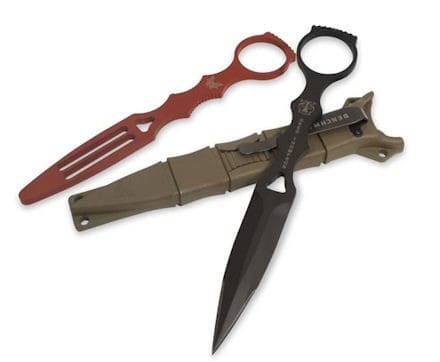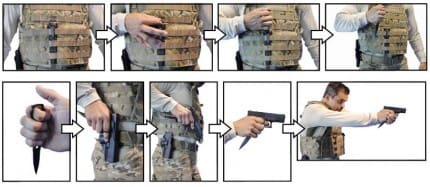Daggers have made a serious comeback. We first ran this story last September, but we constantly get new readers so we thought it would be a good idea to republish it since the story last week on the Benchmade SOCP knife was so popular. We’d also like to add some great comments by reader Acid Gambit that should help dispel much of the misunderstanding of this class of knife.
Greg designed this knife from direct input from THE most elite soldiers in the world. Operational experience built this knife. Thousands of entries into really bad buildings in IZ and AF. It was not dreamed up by video gamers, not range commandos, not cops. Assaulters at the highest level, who have been blind sided and tackled while clearing nasty places were the driving input for this knife.
During CQB it is definitely possible that an assaulter will become tied up in a fight with a bad guy. In many situations he may be unable to use his primary weapon and unable to draw his secondary ( tackled to the ground or over furniture). At this point the knife comes out and can stab and slash the bad guy until the assaulter can get to his pistol and put 2 in the enemy. The knife is used to create space for you to get to your pistol. The assaulter can draw his pistol while still holding the knife, finish the fight, stand up and put his tools away and get back to work.
The knife is not designed for you to run around and do El Prez mag change drills while holding it. I can’t think of a knife that is designed for that, so don’t get confused. The SOC-P knife is meant to save your life and allow you to fight back to your pistol or rifle and still be able to pull the trigger with your strong hand, or support the pistol/rifle with your weak hand, while still holding the knife.
Last week, we mentioned the recently released Special Operations Combatives Program (SOC-P) knife designed by Greg Thompson. While we described the features of the dagger, this graphic from Benchmade does a great job of illustrating the sequence of events of getting it into action and how the SOC-P knife is used.
Tags: Benchmade Knives, Greg Thompson, SOCP




Haha, loved the comment about the El Presidente drills. I can’t imagine how doing a quick mag change with the knife held like that could end any other way than with several stitches and a big band-aid.
Are we really supposed to be concerned with blade wielding right now? This is stupid.
Okay, I’m glad to see a little more detail put into the use and employment of this knife. When I first saw it, I pictured folks running around with the thing in their hands while also wielding a handgun. But its not clear, its not meant for that. Its meant for those moments where neither firearm is available or ready for use, and only to give you enough time to fix that. That makes sense. Something tells me this won’t fit in a normal trouser pocket, though. Given how deep it rides, I think it’d probably only fit in the slash pockets of a set of 5.11s.
now clear*. Typo.
It’s not really meant to wear in a pair of pants.
Can someone please explain to me (cause I have zero HSLD background), how a person ”tackled to the ground or over furniture” can draw this knife and not his sidearm?
In the photos we can see that the knife handle is roughly 25 – 30 cm (or 11 in.) from the sidearm handle. Is this a major difference?
It’s interesting to note that during wartime the need for daggers goes way up but during peacetime everyone stops carrying them and goes back to large utility blades. There are lots of versions of this class of weapon now available including push daggers.
Because of the location of the dagger on the kit (up high toward the center of the torso) combined with a more truncated drawstroke and the way it is employed it can be used to get a booger eater off of you and allow you to get some space between you so you can employ other means to further reduce the threat.
I’ve noticed that, so far, most of the guys who are asking questions or don’t get the concept are guys who probably wouldn’t need it anyway. Guys who would need this, take one look at it and go, “oh yeah…” However, I realize it may take a mental leap to understand what this is for if you don’t understand teh operational environment.
Think about wearing military equipment, (armor, etc) and going into confined, dark spaces with lots of places for people to hide. These are often their homes. These generally aren’t big houses like we have in the west. A couple of rooms, small, dark. If a guy jumps on you, this isn’t going to be on a mat in a gym. There is furniture and trunks or other debris in these rooms. You can get knocked down. You may not have the room to bring even a carbine up to bear. Your biceps may be pinned. The assailant may be trying to wrest your long gun away from you. Your sidearm may be pinned against your side and impossible to draw. However, you may be able to get your hand up to your sternum. If you can draw the dagger, you can turn your hand into a big icepick and just start going to town on the assailant until he lets go.
Eric gave a fantastic explanation but I’ll say a few words. When you have body armor and other gear on, it’s hard enough to draw your pistol standing up under ideal conditions let alone when your laying on your back with someone on top of you trying to kill you. Like Eric said, if you’ve never been there then you probably won’t get it. However, I can think of about a dozen different situations in training and real world that I would have liked to have had one of these because getting to either firearm was impossible.
Gentlemen, thanks for your answers. You are absolutely right. It is a specific tool designed for specific jobs in specific enviroments.
Hell, I’ll be damned, but most of the guys in my unit would think of it as a state-of-the-art orange peeler.
I want one of these, but I can’t find them in stock anywhere.
They sell out quick. Keep trying.
1) Dont lump video gamers, range commandos, and cops together. I’d submit more cops, exponentially more, get assaulted where they can’t draw their sidearm or the bad guy is trying to snatch the gun and the best place for it is the holster. SWAT cops perform CQB and go into bad places with bad people, and they live in little dark houses and apartments full of crap and dogs and other sundry bad things. The 1% of Tier 1 mythical folks that we all lay blades at the alter of, hoping they will stab someone and therefore justify our design, just aren’t a market. They either don’t pay for it because it is given to them due to their status or they get their unit to issue it. Either way, don’t alienate the real market for this knife – the same people that are derisively dismissed at the beginning.
2) Dirk Pinkertons offering is more appropriate for LE, and some would submit the Kabar LE series with the angled blade as well. But since most all SWAT cops now wear armor carriers with MOLLE, this is something useful to them. In most places a gun grab is a deadly force situation.
Disclaimer, I haven’t used or practiced with the SOC-P. Just stating an opinion based off the pictures presented here and personal experience. I prefer a modified kerambit for close quarter manipulation, in such situations assuming s**t has hit the fan AND your primary wep is still somehow disabled, a modified kerambit allows you to reload your secondary. As to ‘will XYZ let go quicker if stabbed/slashed with a longer blade’ … I defer to more experienced operators.
Example of a modified design that still allows one or both hands on secondary, allows ‘fire through’ while blade is in hand, and is more ‘friendly’ if reload is required. It does not make your arm ‘into an icepick.’
http://www.szaboinc.com/edged_detail.asp?offset=60&ID=65
..might as well wear a bobby pin in ur hair & be done with it
@Daz, well, the blade in question gives you a large surface to work with, those two or three inches of reach could be the difference between you getting though a heavy coat, over/around XYZ to hit jugular or femoral… aka to end an engagement. The disadvantage to most if not all modified kerambits.. which are generally very close range slashing weapons, not designed for stabbing at all, which often can end an engagement cleaner and ?more quickly?. (unknown as my boot knife is a dagger, but my vest knife is a kerambit.
I sent one to my buddy currently deployed. 2nd time he had to use it, it snapped in his hand; the grip, not the blade. Very surprising, it’s Benchmade, but nonetheless very disappointing.
Oh, and he’s OK.